Who killed Russia opposition politician Boris Nemtsov?
- Published
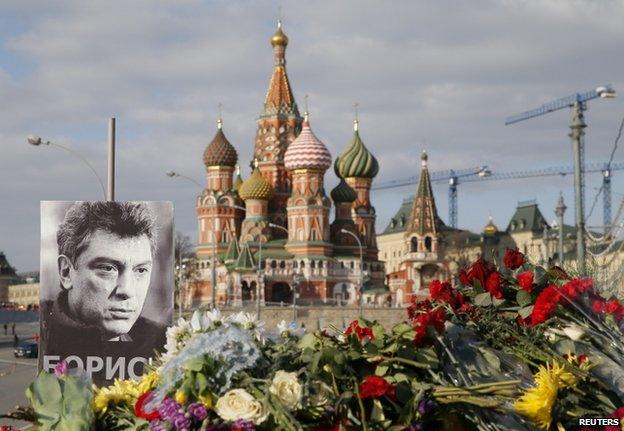
The spot where Nemtsov was shot has been bedecked with flowers
Two arrests have been made over the murder of Russian opposition politician Boris Nemtsov, a crime for which multiple theories still exist.
Was he killed in order to cow opposition to President Vladimir Putin at a time of mounting economic problems? Or because he opposed Russia's alleged covert war in Ukraine?
Or was he shot in full view of the Kremlin in an attempt to discredit Russia's leaders or even intimidate them, or incite a rebellion against them? Perhaps it was an opportunistic attack by someone harbouring a grudge?
Here are some of the theories circulating about who might be behind the killing and why. Some of them stretch the imagination, possibly in an attempt to obscure more obvious truths.

The detainees
Two men were arrested on 7 March, Russian security officials announced, on suspicion of organising and carrying out the murder.
Little was revealed about Anzor Gubashev and Zaur Dadayev other than that they both from the Caucasus region.
Unnamed security sources told Russian media they had been identified after their car was found and security camera images and phone bills were analysed.
Nothing has been revealed officially about the two men's political allegiances and possible motive.
Gunmen from the North Caucasus have been involved in occasional Islamist attacks and organised crime in Moscow since the 1990s, but latterly there is also evidence of them fighting on the pro-Russian rebel side in eastern Ukraine, where Russia is widely suspected of waging a covert war.
Even if the two detainees are tried and convicted of the murder, many will want to know whose orders, if any, they were following.
When five men were convicted last year of shooting journalist Anna Politkovskaya in 2006, a murder which equally shook Moscow, investigators failed to determine who ordered the killing.

President Vladimir Putin
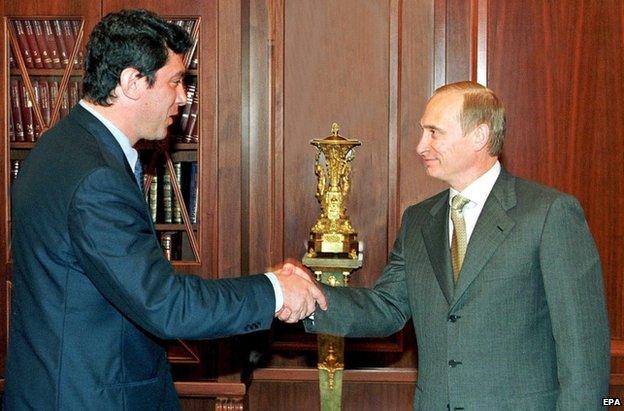
Early cordial relations between Boris Nemtsov (left) and Vladimir Putin, seen here at the Kremlin in July 2000, quickly deteriorated
The Russian leader sought to quell speculation over Kremlin involvement in the death of one of his opponents when he condemned Nemtsov's "brazen murder" and called for an end to the "shameful" political killings that have marked modern Russia.
But Russia's best-known opposition leader, Alexei Navalny, has accused the Kremlin over his friend's death.
Denied the right to attend Nemtsov's funeral as he sat in custody doing a 15-day sentence for illegal pamphleteering, he put out a statement, external (in Russian): "I believe that Nemtsov was murdered by members of a government (special services) or pro-government organisation on the order of the country's political leadership (including Vladimir Putin)."
The question, he added, was whether the order had been given to kill Nemtsov or to "stage an action that would have a high impact".
One of the puzzles of the Nemtsov assassination was that, as a liberal politician from the Yeltsin era, he did not enjoy the kind of popular support given to younger figures like Mr Navalny.
But Mr Navalny argued in his statement that Russia's leaders had decided to combat the country's developing economic problems with a crackdown on the opposition. It was no longer enough for them to "fabricate criminal cases", he said, in a clear reference to the cases brought against him since the mass election protests of 2011-12.
As for the perpetrators of the killing, he suggested they could have been members of informal militias allegedly used by the Kremlin as auxiliary police.
One argument that might counter his theory of a new crackdown is that the security services already enjoy massive power under President Putin, whose own popularity rating increased last month to 86%, according to one poll.

Rogue elements in Russian security services
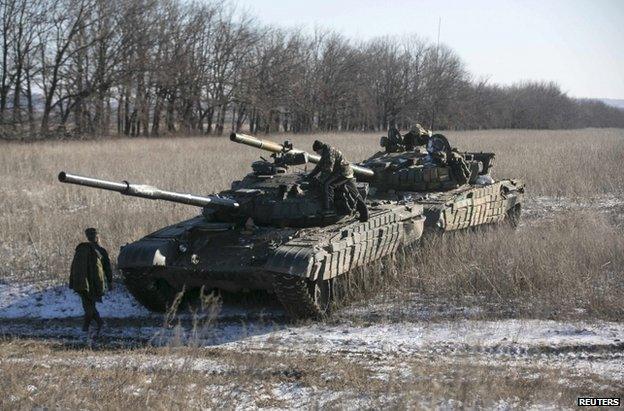
The rebel cause in eastern Ukraine is dear to many Russian nationalists
At the time of his death, Nemtsov was organising an anti-war rally in Moscow and there is some suggestion that the Kremlin or rogue elements in the security forces might have acted to stifle dissent about the war.
"If you support stopping Russia's war with Ukraine, if you support stopping Putin's aggression, come to the Spring March in Maryino [a Moscow suburb] on 1 March," Nemtsov wrote in a social media post, published hours before he was shot, external (in Russian).
According to Ukrainian President Petro Poroshenko, Nemtsov was also planning to publish "some persuasive evidence about the involvement of Russian armed forces in Ukraine".
Although the anti-war rally was cancelled, Russia's small independent media have pressed on with investigating allegations of covert warfare.
It is impossible to know how real a threat Nemtsov posed to the authorities. And a ceasefire President Putin personally helped to negotiate for eastern Ukraine last month finally seems to be taking hold.

Foreign intelligence services
Mr Putin publicly condemned Nemtsov's murder, saying it was "entirely provocative in nature".
"Provocation" is Kremlin code for an attack aimed at destabilising the Russian state. As to who might be behind such an attack, the Kremlin's "chief spin doctor", TV anchorman Dmitry Kiselev, made clear who he thought stood to benefit most.
"When he was alive, Nemtsov was no longer necessary to the West, he had no prospects," he said. "But dead, he was a lot more interesting."
It is a standard line on Russian state-run media that the CIA orchestrated the uprising in Ukraine last year and anti-Russian unrest in other ex-Soviet states in recent years.
However, in the absence of any evidence, few people would take seriously the idea that the CIA staged the killing of Nemtsov in the hope of sparking a violent opposition reaction to President Putin's rule.
An alternative Russian theory, set out in the pro-government Izvestia newspaper (in Russian), external which quoted an unnamed police source, is that the Ukrainian secret service had Nemtsov assassinated by Chechen hit men in order to destabilise Russia.
If this really was a genuine attempt to destabilise Russia, it may be too early to judge. So far opposition reaction has been largely muted, other than that of Mr Navalny in his jail cell.

Ultra-nationalists or Islamic extremists
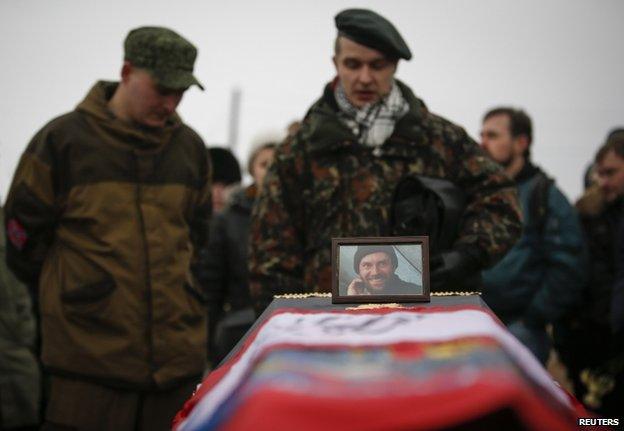
With Russians getting killed fighting for the rebel cause in eastern Ukraine, like former schoolteacher Yevgeny Pavlenko, pacifism has become a dirty word for some
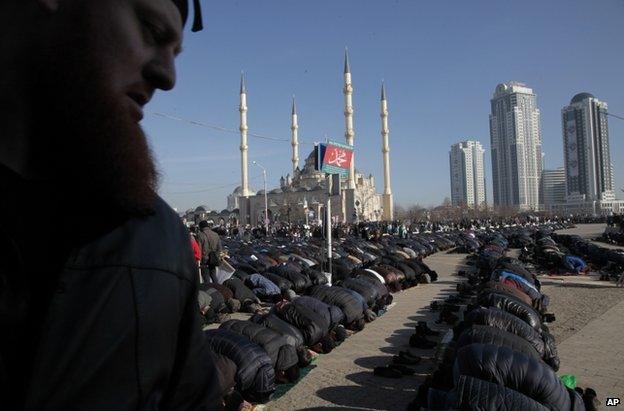
Charlie Hebdo's cartoons of the Prophet Muhammad enraged some Russian Muslims, like these at a mass protest in Chechnya, but why would fanatics single out Nemtsov?
Undoubtedly, there were Russians who hated Nemtsov for his liberal brand of politics and opposition to the war, seen as a sacred cause by many nationalists.
"So who's Nemtsov?" asked one Moscow tweeter. "So much fuss while children and old people perish in Donetsk [eastern Ukraine] each day. Who remembers them?"
One common extreme reaction circulating on Russian-language social media was, "A dog's death for a dog."
One theory is that, rather than seeking mere revenge, Russian ultra-nationalists may have killed Nemtsov as a warning to Mr Putin not to back down in the conflict over Ukraine.
"It is no secret that there are some very radical characters among both sides in the conflict [over Ukraine], who are not subordinated to any authorities," said Vladimir Markin, spokesman for Russia's powerful Investigative Committee.
Another theory advanced by the Investigative Committee (often accused of political bias itself) is that the killers might have been Islamist extremists enraged by his condemnation of the Charlie Hebdo massacre in Paris.
Nemtsov, a famously outspoken politician, made no secret of his Jewish extraction though he was a baptised Christian. But again, where is the credible claim of responsibility?

Jealous lovers or crooks

Anna Durytska, a 23-year-old model, said she knew Nemtsov for three years
Nemtsov had been involved in a well-publicised anti-corruption campaign in Yaroslavl, a provincial town not far from Moscow.
The one alternative theory for his murder given by Mr Navalny is that he had created deadly enemies in the region as a result.
Contract murders for commercial reasons have become less common in Moscow under Vladimir Putin but do still occur. However, the killers were taking a massive risk attacking Nemtsov in one of the most heavily guarded areas of Moscow.
What of the late politician's love life? Even admirers used the epithet "womaniser" in regard to him.
However, the Ukrainian model less than half his age (he was 55) who was with him when he was shot on Friday night could say little about the attack.
Anna Durytska, who was unhurt, told Russian media she had not seen the killer, who had struck from behind. All she had seen, she said, was a light-coloured car which quickly drove off, into the dark.

What do we know about killing?
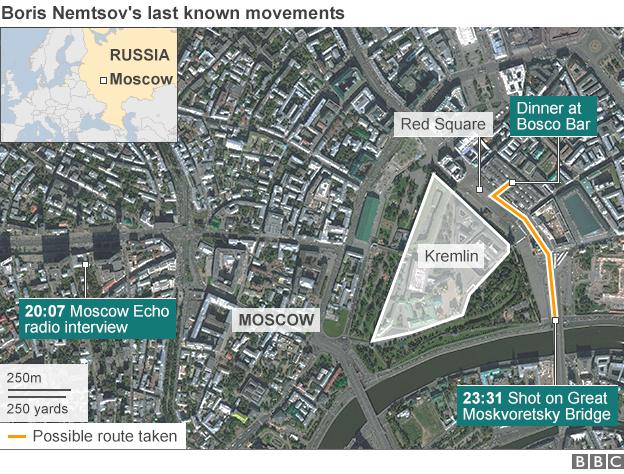
Gunman fired into Nemtsov from behind with a pistol as he walked across a bridge below the Kremlin hand in hand with a young woman
Killer then jumped over the barrier into the road and got into a waiting car, which looked like a Russian vehicle, a witness called Viktor told pro-Kremlin Russian news website LifeNews, external (in Russian)
A police source told LifeNews the gunman was around 1.7m (five foot seven) tall with short dark hair, wearing blue jeans and a brown sweater
Nemtsov's walking companion, Anna Durytska, saw a light-coloured car speeding off
A police source told Russian daily Kommersant old bullets were used, possibly fired from a homemade gun. "Participants in the investigation are only sure of one thing - that the killers were not professionals," the source said

- Published28 February 2015
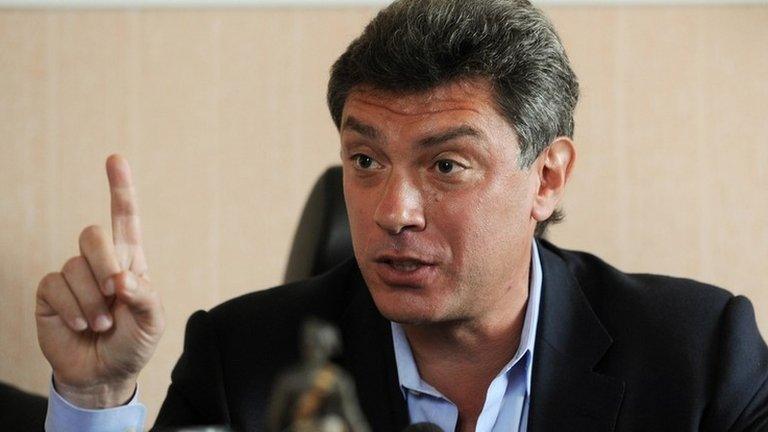
- Published1 March 2015
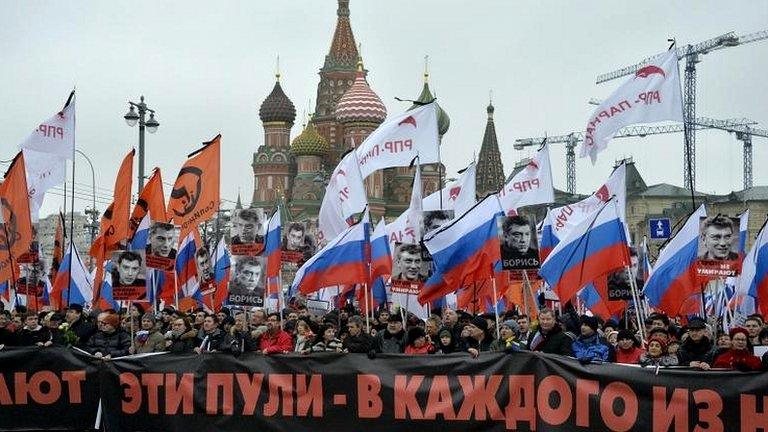
- Published28 February 2015
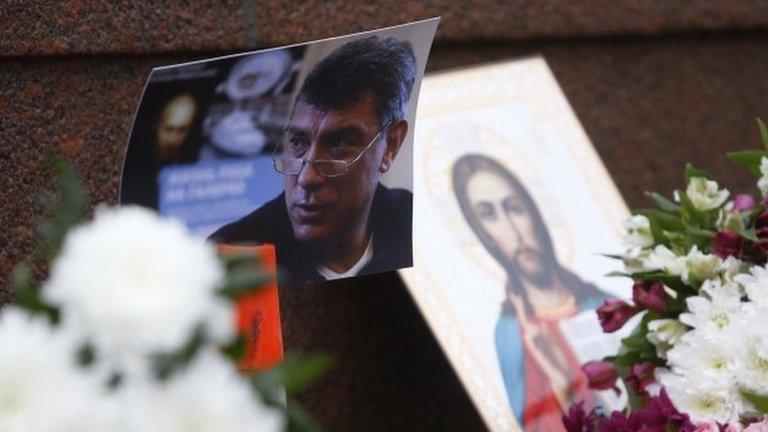
- Published28 February 2015
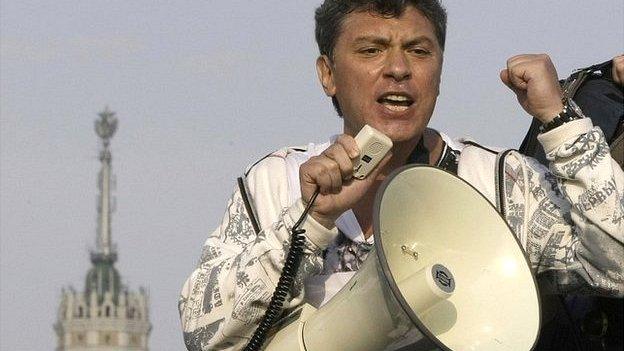
- Published28 February 2015
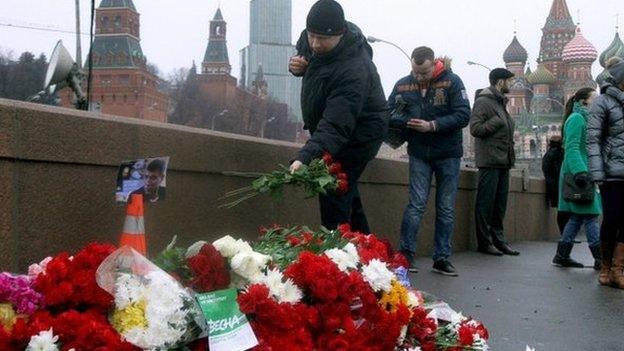
- Published25 March 2024
